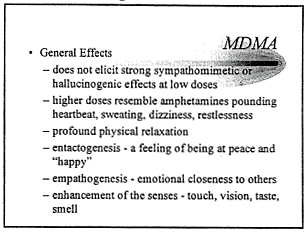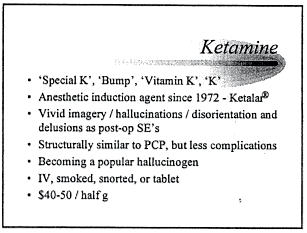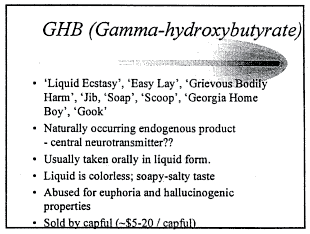California Association of Toxicologists
Page 8
2:00 pm -- "Why All the Rave? Basic pharmacology of rave drugs."
Michael Robertson, PhD Chief Toxicologist, San Diego County Medical Examiner
[View Presentation Handout - 877K]
 Dr Robertson talked about the underground nature of raves, a little history of the rave movement. He mentioned that early raves were a sort of social movement and the drug use was part of the philosophy, but that now the events are very profit oriented and many people just go "to get wasted".
Dr Robertson talked about the underground nature of raves, a little history of the rave movement. He mentioned that early raves were a sort of social movement and the drug use was part of the philosophy, but that now the events are very profit oriented and many people just go "to get wasted".
"many people rave as a form of social relief"
"no medical utility for MDMA" -- noone mentioned anything about possible medical utility of MDMA.
One amusing and fun note, Dr Robertson used a large number of images from erowid. Perhaps 70% of his images were from our archives.
He said that some types of basic screens don't detect MDMA, but one of the CA DOJ people said that their Radio Immuno Assay actually has a higher affinity for MDMA than for meth, and it definitely detects MDMA metabolites in urine.
"at 96 hours you're not likely to see MDMA in blood or urine"
Most tests don't differentiate between D & L methamphetamine, so vicks inhalers can show up as meth.
Dr Robertson was generally pretty informed, but made some silly mistakes (as is common / prevalent outside the subculture) like when talking about ketamine "if you are in 'K-land', you're having a good time, if you're in a 'K-Hole', you're having a bad trip."[earth: Although the use of slang terms varies from person to person and group to group, 'K-hole' denotes just a deep, usually high dose, experience and does not suggest either good or bad trip.]
He also said that some "cannabis may contain LSD", which struck me as bizarre and requiring substantial documentation.
 Another major error is his misunderstanding of the term "hallucination": he said "you don't realize you're hallucinating, you actually believe what you see is real on LSD." I believe he would find that this 1) not the 'medical' definition of this term, 2) a rare effect of psychedelics (although it does happen), and 3) the primary problem with using the term "hallucinogen" with these substances is that non users don't understand that most 'hallucinations' are just visual effects such as patterning, color shifts, and motion that the user rarely mistakes for 'real'.
Another major error is his misunderstanding of the term "hallucination": he said "you don't realize you're hallucinating, you actually believe what you see is real on LSD." I believe he would find that this 1) not the 'medical' definition of this term, 2) a rare effect of psychedelics (although it does happen), and 3) the primary problem with using the term "hallucinogen" with these substances is that non users don't understand that most 'hallucinations' are just visual effects such as patterning, color shifts, and motion that the user rarely mistakes for 'real'.
He talked about how benzodiazepines are common in drug facilitated rape, but that rohypnol is extremely rare. He said that alcohol can be used to increase the effects of benzos.
He seemed to think that River Phoenix's death was the start of GHB's notoriety, even though he was very clear that his death was not GHB related and had just been misreported. He thought that the public must have thought "if river phoenix can get high and die on this stuff, so can I" (he was joking, but he definitely thinks that Phoenix's death was a catalyst for increased use). [earth-- I don't know what to think of this, but I think my impression is just that Phoenix's death happened at the start of the media awareness and popularity of GHB as a recreational intoxicant, so they are more coincident than causally linked.]
He said that if you have a water bottle with GHB in it and shake it, it should foam a lot because GHB acts as a mild "detergent".
He also said that GBL (lactone) is "sold in hardware stores as floor stripper" [earth- I'll try to confirm or discount that. ] and that "GBL use is rampant throughout the country."
 Dr Robertson was one of the chief experts in the Samantha Reid case.
Dr Robertson was one of the chief experts in the Samantha Reid case.
He said that the body contains small amount of GHB at all times and that after death, the body's GHB level rises over time and that if you need to test a dead body for GHB, you have to test it very quickly or you'll get useless results. I asked him about both of these points after his talk because there has been some confusion on this issue and he said that GHB is absolutely, positively in the blood and urine always in low levels because its a metabolite or precursor to GABA. He said that he was working on a paper on the issue of GHB increases after death, but that the issue is "very well documented" in many places.
Overall I enjoyed his talk although this session felt the longest and slowest, perhaps because it seemed like a lot of what he covered had already been talked about? Or perhaps it was the lunch food kicking in for that post-eating lethargy.
NextPage
Michael Robertson, PhD Chief Toxicologist, San Diego County Medical Examiner
[View Presentation Handout - 877K]
 Dr Robertson talked about the underground nature of raves, a little history of the rave movement. He mentioned that early raves were a sort of social movement and the drug use was part of the philosophy, but that now the events are very profit oriented and many people just go "to get wasted".
Dr Robertson talked about the underground nature of raves, a little history of the rave movement. He mentioned that early raves were a sort of social movement and the drug use was part of the philosophy, but that now the events are very profit oriented and many people just go "to get wasted"."many people rave as a form of social relief"
"no medical utility for MDMA" -- noone mentioned anything about possible medical utility of MDMA.
One amusing and fun note, Dr Robertson used a large number of images from erowid. Perhaps 70% of his images were from our archives.
He said that some types of basic screens don't detect MDMA, but one of the CA DOJ people said that their Radio Immuno Assay actually has a higher affinity for MDMA than for meth, and it definitely detects MDMA metabolites in urine.
"at 96 hours you're not likely to see MDMA in blood or urine"
Most tests don't differentiate between D & L methamphetamine, so vicks inhalers can show up as meth.
Dr Robertson was generally pretty informed, but made some silly mistakes (as is common / prevalent outside the subculture) like when talking about ketamine "if you are in 'K-land', you're having a good time, if you're in a 'K-Hole', you're having a bad trip."[earth: Although the use of slang terms varies from person to person and group to group, 'K-hole' denotes just a deep, usually high dose, experience and does not suggest either good or bad trip.]
He also said that some "cannabis may contain LSD", which struck me as bizarre and requiring substantial documentation.
 Another major error is his misunderstanding of the term "hallucination": he said "you don't realize you're hallucinating, you actually believe what you see is real on LSD." I believe he would find that this 1) not the 'medical' definition of this term, 2) a rare effect of psychedelics (although it does happen), and 3) the primary problem with using the term "hallucinogen" with these substances is that non users don't understand that most 'hallucinations' are just visual effects such as patterning, color shifts, and motion that the user rarely mistakes for 'real'.
Another major error is his misunderstanding of the term "hallucination": he said "you don't realize you're hallucinating, you actually believe what you see is real on LSD." I believe he would find that this 1) not the 'medical' definition of this term, 2) a rare effect of psychedelics (although it does happen), and 3) the primary problem with using the term "hallucinogen" with these substances is that non users don't understand that most 'hallucinations' are just visual effects such as patterning, color shifts, and motion that the user rarely mistakes for 'real'.He talked about how benzodiazepines are common in drug facilitated rape, but that rohypnol is extremely rare. He said that alcohol can be used to increase the effects of benzos.
He seemed to think that River Phoenix's death was the start of GHB's notoriety, even though he was very clear that his death was not GHB related and had just been misreported. He thought that the public must have thought "if river phoenix can get high and die on this stuff, so can I" (he was joking, but he definitely thinks that Phoenix's death was a catalyst for increased use). [earth-- I don't know what to think of this, but I think my impression is just that Phoenix's death happened at the start of the media awareness and popularity of GHB as a recreational intoxicant, so they are more coincident than causally linked.]
He said that if you have a water bottle with GHB in it and shake it, it should foam a lot because GHB acts as a mild "detergent".
He also said that GBL (lactone) is "sold in hardware stores as floor stripper" [earth- I'll try to confirm or discount that. ] and that "GBL use is rampant throughout the country."
 Dr Robertson was one of the chief experts in the Samantha Reid case.
Dr Robertson was one of the chief experts in the Samantha Reid case.He said that the body contains small amount of GHB at all times and that after death, the body's GHB level rises over time and that if you need to test a dead body for GHB, you have to test it very quickly or you'll get useless results. I asked him about both of these points after his talk because there has been some confusion on this issue and he said that GHB is absolutely, positively in the blood and urine always in low levels because its a metabolite or precursor to GABA. He said that he was working on a paper on the issue of GHB increases after death, but that the issue is "very well documented" in many places.
Overall I enjoyed his talk although this session felt the longest and slowest, perhaps because it seemed like a lot of what he covered had already been talked about? Or perhaps it was the lunch food kicking in for that post-eating lethargy.


